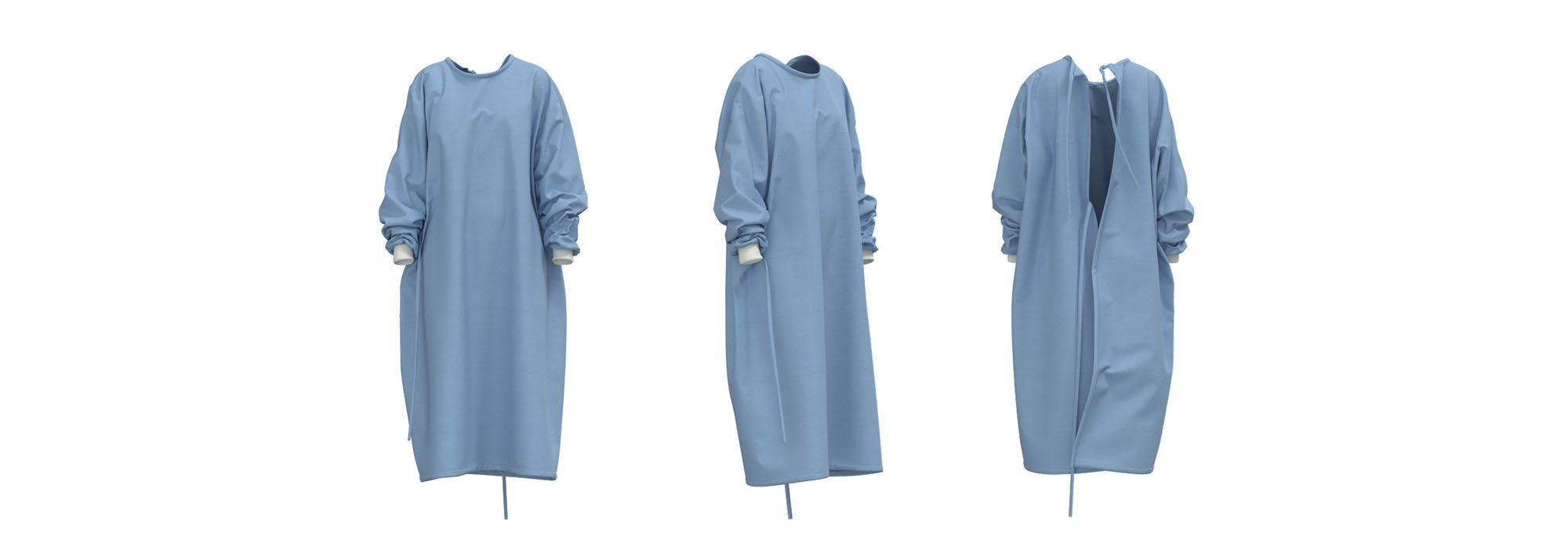Not a day goes by that we don’t hear news about the supply and quality of personal protective equipment for our healthcare staff. While many of TenCate Protective Fabrics’ products have been used for healthcare workwear for years, COVID-19 has created a great need, especially for masks and medical gowns. By working proactively with our partners in the Dutch protective workwear value chain, we’ve been able to develop a reusable protective gown specifically for essential healthcare workers in the Netherlands who don’t face direct contact with COVID-19-infected patients. It’s breathable, comfortable, and can be washed at least 50 times, which secures hospital supplies and significantly reduces medical waste. But how did we come to develop this solution? And why are Dutch hospitals urgently in need of our help?
Insufficient supply
As the pandemic exploded, and in the push to quickly provide all their staff with the right personal protective equipment (PPE), many hospitals chose to outfit them in disposable medical gowns. While disposables offer necessary protection for medical first responders on the COVID-19 frontlines, they can be an over-engineered solution for non-frontline tasks. Not only do they provide unnecessary high levels of protection for these non-frontline workers, they’re uncomfortable to wear for long periods of time. Currently, the high demand for disposable medical gowns is threatening supply for those who truly need them, with some hospitals in the Netherlands struggling to provide medical professionals with sufficient protection.
Taking action
Development agency Oost NL (East Netherlands Development Agency), which acts as a bridge between the government, companies and knowledge institutes, reached out to TenCate Protective Fabrics together with Health Innovation Park, accelerator of innovations in healthcare. They invited us to use our expertise to help solve the current gown shortage in the Netherlands, asking us the question: “How can we work together to innovate and quickly provide Dutch hospitals with a more secure solution?” We had been hearing the same need from our European end users, so with the additional request from Oost NL and Health Innovation Park, we strengthened and sped up the process.
TenCate Protective Fabrics reached out to four Dutch giants in the healthcare workwear industry — De Berkel, Ballyclare, HAVEP, and Van Moer. We also collaborated with Modint, the Dutch branch organisation for textile and clothing manufacturers, importers, agents and wholesalers. The collective expertise proved invaluable. Together, we developed this reusable fabric gown that can be produced in the Netherlands (thus securing supply). To make it an accessible solution for as many people as possible, we created the gown in one standard size.
 3D concept of medical gown by Modint
3D concept of medical gown by Modint
We presented our solution to the Landelijk Consortium Hulpmiddelen (LCH), an emergency consortium set up by the Dutch Ministry of Health, Welfare and Sport. The aim of the LCH is to procure medical supplies and protective equipment in short supply, out of national interest and with no consideration of profit. The LCH reacted enthusiastically to our proposal. They had already been looking for a domestically-produced reusable alternative to single-use medical gowns, so our solution was immediately deemed a viable one.
What are the benefits of reusable medical gowns?
- Comfortable
Compared to disposables or laminated products, a reusable gown is breathable enough to comfortably work all day long. - Low cost of ownership
Reusable gowns can be washed a minimum of 50 times, making their cost-per-use low in the long run.
- Secure supply
Thanks to the supply continuity by a domestic supply chain, there is readily available stock. - Sustainable
Medical gowns made out of fabric are by definition more durable than disposables, and lead to much less medical waste. With the help of our Ecotool, we’ll be able to show how the sustainable advantage translates into actual numbers. - High performing
Carefully developed in accordance with industry norms, our reusable gown is suitable for industrial washing.
What’s next?
As COVID-19 measures ease at the moment, we urge hospitals to use this “pause” to prepare themselves for a potential next wave. This is the moment to stock up on essential protective equipment. It’s clear that no one wants to be surprised by shortages in medical gowns a second time.
While TenCate Protective Fabrics and these Dutch garment makers are already actively helping individual hospitals in the Netherlands and Europe to obtain these reusable medical gowns, we welcome the chance to help on a larger scale by working together with the LCH. Together with our partners, our goal would be to provide the Netherlands with a trustworthy product from a secure supply chain in the coming months, and also long-term. We’ve calculated a potential production capacity of up to 500,000 reusable gowns in 2020, with the first gowns able to be delivered by the end of August.
We feel very honored to be able to serve the overextended Dutch healthcare sector by innovating new, more reliable, more sustainable, and regionally-produced protective workwear solutions for them as they navigate the COVID-19 pandemic. We hope to come to a concrete agreement with LCH as soon as possible, as we’re ready to start producing reusable medical gowns for hospitals in need.
Header image: sustainable medical gowns by Van Popering






